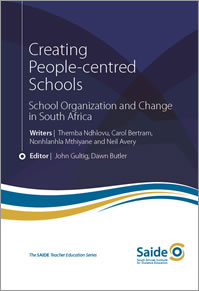This module deals with school organizational change and development to provide the context in which systematic learning takes place, particularly in developing countries. It is designed for practising classroom teachers as well for those who play a role in school management.
The module is likely to be most appropriate for practising teachers, and is potentially useful but probably not essential for introducing teachers-to-be to different kinds of organizational contexts. The focus on South Africa is easily adaptable to other contexts as the use of ideas and issues from the literature provide a common thread across all schools.
The four sections of Creating People-centred Schools present a coherent progression. Access the full version here. Each section is also downloadable as an individual unit.
- Cover, title and imprint pages, with contents list and preface
- Section One: Introducing the module
- Section Two: School organization: a brief history
- Section Three: New contexts, new policies: new schools?
- Section Four: Changing schools
The Creating a People Centred Schools is supported by a set of 13 readings, some of which can be accessed from this website (highlighted in blue). For those not available, you can contact the publishers listed below for permission to use the readings. A full set is available from Saide at info saide [dot] org [dot] za (info[at]saide[dot]org[dot]za).
saide [dot] org [dot] za (info[at]saide[dot]org[dot]za).
Reference list for Section One
- Reading 1: Department of Education. 1996. Changing management to manage change. Pretoria: Department of Education/EMD Task Team
- Reading 2: MacGregor, K. 1997. South Africa: juggling education and economic development. Leading Edge, Issue 8, July 1997. Cape Town: Independent Development Trust.
Reference list for Section Two
- Reading 3: McLagan, P. and Nel, C. 1995. Structures: flow, not boxes. From The Age of Participation. Randburg: Knowledge Resources. By kind permission of the publisher.
- Reading 4: Pinchot G., and Pinchot E. 1993. Why bureaucracy works. From The End of Bureaucracy and the Rise of the Intelligent Organization. San Francisco: Berrett-Koehler. By kind permission of the publisher.
- Reading 5: Senge, P. 1990. The five disciplines of a learning organisation. From The Fifth Discipline. Doubleday and Random Century Business Books.
- Reading 6: Mbigi, L. The spirit of African management. From Christie, Lessem, and Mbigi. 1994. African Management:Philosophies, Concepts and Applications. Randburg: Knowledge Resources. By kind permission of the publisher.
Reference list for Section Three
- Reading 7: Hopkins D., Ainscow, M. and West M. 1994. Culture and structure in school improvement. In School Improvement in an Era of Change. London: Cassell.
- Reading 8: Davidoff S., and Lazarus S. 1997. Leadership and management in building 'learning' schools. From The Learning School: An Organization Development Approach. Cape Town: Juta. By kind permission of the authors and the publisher.
- Reading 9: Fullan, M., and Miles, M. Getting school reform right. The first part of this article is taken from the June 1992 edition of Phi Delta Kappan, while Part 2 is taken from Fullan, M. 1993.Change Forces. London: Falmer Press.
- Reading 10: Marris, P. 1974. The management of personal change. From Loss and Change. London: Routledge.
Video
The video is linked to sections of the learning guide, but also offers much scope for creative use in free-standing ways.
- Introduction
Visuals of how historical and social problems have impacted on schools. The fact that schools may also be badly managed leads to the question of how they might be better managed.
DOWNLOAD (39.7 MB) OR VIEW (2:41 MINS) - Creating People Centred Schools
By visiting schools we learn more about two approaches to school change and improvement: the school-as-organization model based on internal reflection and action; and the schools-as-community approach based on networking.
DOWNLOAD (18.8 MB) OR VIEW (11:32 MINS) - The School as Organisation Approach
We learn more about the organizational approach during the course of a visit to a school that has successfully implemented this model. Participants are also interviewed.
DOWNLOAD (136 MB) OR VIEW (16:43 MINS)
Audiotape
The audiotape is linked to sections of the learning guide, but carries debates which could also be used in a free-standing way by anyone interested in school organization and change.
- The learning organization - 11:52 MINS
- Cultures and hierarchies in schools: changing school cultures as well as structures - 3:36 MINS
- Changing management to manage change: a government report - 4:27 MINS
- School effectiveness and school improvement - 7:42 MINS
- What is a learning organization? - 4:09 MINS
- Managing change - 5:04 MINS
- Taking account of traditional ways of learning in Africa - 3:53 MINS
- ‘Schools as organization’ and ‘Schools as community’ approaches - 4:12 MINS
- Experiences of a school-based reform initiative - 11:45 MINS

